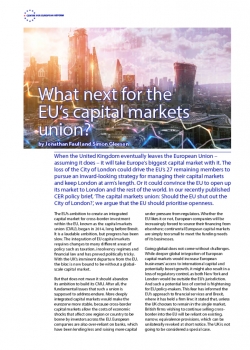
What next for the EU's capital markets union?
Europe needs deep and liquid capital markets. The best way to ensure that is to open up to global capital markets, including London.
When the United Kingdom eventually leaves the European Union – assuming it does – it will take Europe’s biggest capital market with it. The loss of the City of London could drive the EU’s 27 remaining members to pursue an inward-looking strategy for managing their capital markets and keep London at arm’s length. Or it could convince the EU to open up its market to London and the rest of the world. In our recently published CER policy brief, ‘The capital markets union: Should the EU shut out the City of London?’, we argue that the EU should prioritise openness.
The EU’s ambition to create an integrated capital market for cross-border investment within the EU, known as the capital markets union (CMU), began in 2014, long before Brexit. It is a laudable ambition, but progress has been slow. The integration of EU capital markets requires changes to many different areas of policy such as taxation, insolvency regimes and financial law and has proved politically tricky. With the UK’s imminent departure from the EU, the bloc is now bound to be without a global-scale capital market.
But that does not mean it should abandon its ambition to build its CMU. After all, the fundamental issues that such a union is supposed to address endure. More deeply integrated capital markets would make the eurozone more stable, because cross-border capital markets allow the costs of economic shocks that affect one region or country to be borne by investors across the EU. European companies are also over-reliant on banks, which have been lending less and raising more capital under pressure from regulators. Whether the EU likes it or not, European companies will be increasingly forced to source their financing from elsewhere; continental European capital markets are simply too small to meet the funding needs of its businesses.
Going global does not come without challenges. While deeper global integration of European capital markets would increase European businesses’ access to international capital and potentially boost growth, it might also result in a loss of regulatory control, as both New York and London would be outside the EU’s jurisdiction. And such a potential loss of control is frightening for EU policy-makers. This fear has informed the EU’s approach to financial services and Brexit, where it has held a firm line: it stated that, unless the UK chooses to remain in the single market, British firms wishing to continue selling cross-border into the EU will be reliant on existing, narrow, equivalence provisions, which can be unilaterally revoked at short notice. The UK is not going to be considered a special case.
Europe should seek to maximise its involvement in global financial markets and its voice in their regulation.
Brussels sees scope for trade-offs in future EU-UK arrangements in various areas. The EU is attempting to use every aspect of regulation as a negotiating lever to gain advantages elsewhere. In particular, it believes that, since access to EU customers is a priority for UK firms, the denial of such access is a potential negotiating tool for the EU. The Commission’s recent attempt to use the threat of de-recognition of the Swiss stock market as a negotiating tool in its broader negotiations with the Swiss is an example of this happening on a smaller scale.
However, the EU’s own equivalence rules would make it extremely difficult for Europe to actively discriminate against UK businesses without applying corresponding measures to American, Asian and other foreign firms. Since the EU is, above all, a rules-based system, it struggles not to act in accordance with its own rules. As such, any politically motivated ‘raising of the drawbridge’ against the UK would mean raising the drawbridge to international finance in general.
While concerns about loss of regulatory control are legitimate, they must not be allowed to curtail companies’ access to finance unnecessarily. The days of financial autarky are gone, and Europe cannot bring them back. Europe should accept that its future is as a participant in global financial markets, and seek to maximise its involvement in those markets, and its voice in their regulation.
The relationship with the UK is most important. Regardless of the legal form of the future EU-UK arrangement, the EU needs to ensure regular exchange of information, deep supervisory co-operation and joint policy-making on future challenges between EU and UK authorities. The UK could offer the EU involvement in the formulation and implementation of regulation in London markets. This could be achieved through a joint policy-making forum between the UK and the EU regulatory authorities, with formal structures in place governing supervision of institutions active in both markets.
Formal, institutionalised co-operation on capital markets' regulation should be the goal of both London and the EU-27.
The financial relationship with post-Brexit Britain would have been best managed through a mutual recognition arrangement – but such an arrangement was always a London pipe-dream; the EU will not accept legally-binding mutual recognition in financial services, and there was never any chance of it being extended to an exiting country. In the absence of such legally binding measures, formal, institutionalised co-operation should remain the ultimate objective of supervisors and regulators on both sides of the channel, regardless of the legal form of the eventual settlement between the UK and the EU.
When it comes to capital markets, Europe cannot go it alone. And it would regret trying.
Sir Jonathan Faull, Chair, European Public Affairs, Brunswick Group. European Commission 1978-2016. Member of the CER advisory board. All views expressed are personal.
Simon Gleeson, Partner, Clifford Chance LLP

